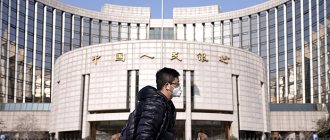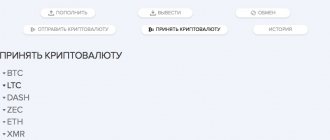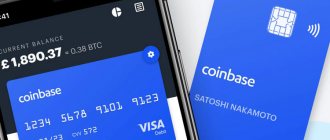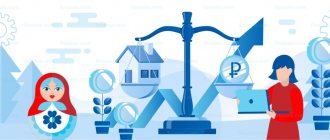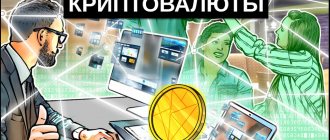Digital Economy is an economic activity focused on digital and electronic technologies. This includes e-business and commerce, as well as the goods and services they produce. Essentially, this definition covers all business, cultural, economic and social transactions carried out on the Internet and through digital communication technologies.
The term was first used in the book The Digital Economy: Promise and Peril in the Age of Networked Intelligence by author Dawn Tapscott in 1995. Over the past 15 years, the growth of the Internet economy has been particularly noticeable. There is a huge growth in digital platforms. Consumers are increasingly influenced by what they see on Facebook, Twitter, Instagram or YouTube. The Internet is integrated into all aspects of human life, including such indispensable structures as healthcare, education and banking.
The “Strategy for the Development of the Information Society of the Russian Federation for 2017-2030”, approved in Russia, gives the following definition of the digital economy:
“The digital economy is an economic activity in which the key factor of production is data in digital form, the processing of large volumes and the use of analysis results of which, in comparison with traditional forms of management, can significantly increase the efficiency of various types of production, technologies, equipment, storage, sales, delivery goods and services."
In other words, the digital economy is an activity directly related to the development of digital computer technologies, which includes services for the provision of online services, electronic payments, online commerce, crowdfunding, etc. Usually the main elements of the digital economy are called:
- e-commerce,
- Internet banking and electronic payments,
- cryptocurrency and blockchain,
- Internet advertising and online games.
The digital economy is production based on digital technologies. Currently, about half of the world's population uses the Internet in everyday life for learning and doing business. The volume of virtual trade in the near future will exceed standard types of trade relationships. Digitized money is easier to use and much more difficult to counterfeit.
Virtual life is an industry where new products are produced and the craziest ideas are realized. Testing new inventions has become more accessible and faster - there is no need for real tests. Emulation allows you to identify the pros and cons of new products at minimal cost. The electronic economy, according to experts, will completely change the usual business processes and economic relationships.
What is the digital economy in simple words
The digital economy is a type of economic activity that focuses on electronic and digital technologies. This also includes e-business and commerce.
The concept of the digital economy covers all social, business, economic and online communication technologies. The term was first used in a book by Don Tapscott in 1995. In recent years, the growth of the Internet economy has been the most significant. First of all, this is noticeable by the constant emergence of new digital platforms.
Social networks also have a great influence on the consumer; previously it was not so significant. At the moment, the Internet is an integral part of human life. It is also tightly integrated into banking, healthcare, education and other areas. The digital economy can be considered an activity that is closely related to the progress of computer technology, combining services related to the provision of online services, as well as electronic payments, crowdfunding and trade, and others.
The main elements of the digital economy are considered to be the following:
- online games and online advertising;
- e-commerce;
- electronic transfers and Internet banking;
- blockchain and cryptocurrency.
The digital economy can also be thought of as production that is based on digital technologies. At the moment, approximately 50% of the world's population uses the Internet every day for the purpose of studying or conducting business. It is predicted that the quantity sold online will soon surpass other types of trading relationships.
This is partly because electronic payments are much more secure than transferring paper money. In virtual life, at the moment, a large number of new ideas are being implemented and new products are emerging. If there is a need to test a new invention, thanks to new technologies, this can be done much better and faster.
Using project emulation, scientists identify all their pros and cons with minimal cost. In a few more years, according to experts, the electronic economy will make big changes in the understanding of doing business and economic relationships. Every future businessman must understand that to successfully start his business, he must learn the basics of the digital economy.
- Market economy;
- Efficient market theory;
- Mixed economy;
Research journal
Review of the article
Filippovich Andrey Vladimirovich, Scientific supervisor: Voloshin Andrey Vladimirovich 1. Bachelor student, Siberian Federal University. 2. Candidate of Economic Sciences, Associate Professor of the Department of Trade and Marketing, Siberian Federal University, Filippovich Andrey Vladimirovich, Scientific adviser: Voloshin AV 1. The student-bachelor, Siberian Federal University 2. candidate of economic Sciences, associate Professor of the Department of Trade and Marketing, Siberian Federal University
Abstract: In this article, the author conducts a study of various theoretical approaches to the essence of the definition of the digital economy. The definition of the digital economy proposed by the author allows us to more specifically define its essence, and a systematized classification can be used as a tool for its identification. Abstract: In this article, the author conducts a study of various theoretical approaches to the essence of the definition of the digital economy. The definition of digital economy proposed by the author allows to define its essence more specifically, and a systematized classification can be used as a tool for its identification.
Key words: digital economy, high-speed economy, economics, entrepreneurship. Keywords: digital economy, high speed economy, economy, entrepreneurship.
In 1995, American computer scientist Nicholas Negroponte, teaching at the University of Massachusetts, coined the term “digital economy.” This term is currently widely used throughout the world, used by politicians, entrepreneurs and journalists. In 2016, one of the main reports of the World Bank published a report on the state of the digital economy in the world (the report was released under the title “Digital Dividends”). However, the content of this concept still remains vague, and there is no clear definition in the World Bank report.
This topic is so important that it is even discussed at the country level. Thus, at the G20 summit in Hangzhou (2016), the “G20 Digital Economy Development and Cooperation Initiative” was proposed, in which the digital economy is characterized as “a wide range of economic activities that include the use of digitized information and knowledge as a key factor of production, modern information networks as an important space for activity and the effective use of information and communication technologies (ICT) as an important factor in productivity growth and optimization of the economic structure"
Russia, like many countries, has the intention of “digitalizing” its economy. One could even say that the digital transformation of the Russian economy is becoming one of the main strategic directions of its development. The President of the Russian Federation V.V. drew attention to this more than once. Putin. In his Address to the Federal Assembly for 2022, the President set the task of preparing a special program for creating a digital economy. But the President spoke in full about how important it is, how urgent it is, in June 2022 at the St. Petersburg Economic Forum. Appearance in the speech of the President of the Russian Federation V.V. Putin’s detailed thesis that the digital economy will determine the future and, in fact, is the locomotive of the country’s development, immediately found a worthy audience capable of its implementation. And the relevance of this topic today is one of the most important reasons for the appearance of so many authors who offer their interpretation of the concept of “digital economy”.
The complexity of this concept is due to the ambiguity of theoretical approaches as this is a very new topic, the intricacies of which have yet to be studied. The author of the article provides a number of definitions that, in his opinion, are the most appropriate.
For example, Meshcheryakov R.V. states [7] that there are two approaches to the term “digital economy”. The first approach is from “classical economics”: the digital economy is an economy based on digital technologies and, at the same time, it is more correct to characterize exclusively the area of electronic goods and services. The second approach is an expanded one: “digital economy” is economic production using digital technologies.”
In turn, Yakutin Yu.V. [2] says that the digital economy is an economic activity in which the key factor of production is data in digital form, the processing of large volumes and the use of analysis results of which, compared with traditional forms of management, can significantly increase the efficiency of various types of production, technologies, equipment , storage, sale, delivery of goods and services.
A similar definition is given by Engovatova A.A. [7], she states that “The digital economy is an economy based on new methods of generating, processing, storing, transmitting data, as well as digital computer technologies.”
Ivanov V.V. [7] gives this concept the broadest definition: “The digital economy is a virtual environment that complements our reality.”
Definition given by Komarova M.A. and Prokopieva A.I. extremely similar to the definition given by V.V. Ivanov They argue that the digital economy is a symbiosis of the virtual and real economies, based on interaction and the creation of public values.
Evtyanova D.V. [4] considers the digital economy to be nothing more than automated economic management based on advanced information technologies; a new economic structure based on effective information management of the production system, in which the modern world is necessary for successful economic growth.
Research by Leonova K.S. helped her in her work to outline the concept in which the digital economy is understood as a set of social relations that develop when using electronic technologies, electronic infrastructure and services, technologies for analyzing large amounts of data and forecasting in order to optimize production, distribution, exchange, consumption and increase the level of socio-economic development of states.
Speaking about the essence of the digital economy, Russian President V.V. Putin states that “the digital economy is not a separate industry; in fact, it is a way of life, a new basis for the development of the public administration system, the economy, business, the social sphere, and the whole society.” [8]
In the course of the analysis of various aspects of this concept, Panshin B.N. [6] concluded that technologically, the digital economy is an environment in which legal entities and individuals can contact each other regarding joint activities.
Pyatkin V.V. [5], on the contrary, says that the digital economy is just a synonym for the Electronic (web, Internet economy) economy - that is, economic activity based on digital technologies associated with e-business and e-commerce, and produced and the electronic goods and services they sell.
Under the digital economy A.E. Zubarev [3] implies a systemic set of economic relations regarding the production, distribution, exchange and consumption of goods and services of a techno-digital form of existence.
After conducting his own research, Professor N.A. Zhuravleva [1] came to the conclusion that the high-speed economy is a way of doing business in which the main effect is detected by assessing the cost of time as the main non-renewable resource.
At the end of the article, we can conclude that the theoretical approaches to determining the essence of the digital economy are similar. Various authors interpret this concept in their own way; today there is no single generally accepted definition of the category “digital economy,” which contributes to the development of scientific discussion.
A generalization of the works presented in the study allows the author of the article to consider the digital economy as a set of innovations, as a result of which most of the production of both goods and services will require less labor, which will reduce unit costs of production, make goods and services more accessible and of high quality.
Bibliography
1. Zhuravleva, N.A. Digital economy as the basis of a high-speed economy [Text] / N.A. Zhuravleva // Transport systems and technologies.- 2022.- No. 2 (8).- P.47-49 2. Yakutin, Yu.V. Russian economy: digital transformation strategy (constructive criticism of the government program “digital economy of the Russian Federation”) [Text] / Yu.V. Yakutin // Management and business administration.- 2022.- No. 4.- P.27-52 3. Zubarev, A.E. Digital economy as a form of manifestation of patterns of development of the new economy [Text] / A.E. Zubarev // Bulletin of the Pacific State University.- 2022.- No. 4(47).- P.177-184 4. Evtyanova, D.V. Criteria for creating digital platforms for economic management [Text] / D.V. Evtyanova // Economic systems.- 2017.- No. 3(38).- P.54-57 5. Pyatkin, V.V. From the information society to the digital economy or to the knowledge economy? [Text] / V.V. Pyatkin // Bulletin of modern research.- 2022.- No. 7.1(22).- P.244-246 6. Panshin, B.N. Digital economy: features and development trends [Text] / B.N. Panshin // Science and Innovation. - 2016. - No. 3. - P. 17-20 7. Digital economy: how experts understand this term [electronic resource]. - Access mode: https://finance.rambler.ru/economics (Date of access: December 21, 2018) 8. Bigaev, Z.V. Prospects for the development of the digital economy in the Russian Federation [Text] / Z.V. Bigaev // Student: electron. scientific zhurn.- 2022.- No. 8(28).- P. 9. Decree of the President of the Russian Federation dated 05/09/2017 No. 203 “On the Strategy for the Development of the Information Society in the Russian Federation for 2022 - 2030” // Collection of Legislation of the Russian Federation . – 05/15/2017, N 20, art. 2901 10. Voloshin, A.V. Economic mechanism as a tool for increasing the efficiency of enterprises: collection of articles. scientific articles [Text] / A.V. Voloshin // Management in the context of global world transformations: economics, politics, law. - Sevastopol: Limited Liability Company "Publishing House Arial Printing House", 2016. - P. 173-177. 11. Voloshin, A.V. Competitiveness of the region as a subject of research in economic science [Text] / A.V. Voloshin, Yu.L. Alexandrov, S.N. Shestov, E.V. Belonogova // Fundamental Research. - 2016. - No. 10-1. — P. 113-118. 12. Voloshin, A.V. Formation of a mechanism for increasing the competitiveness of higher education organizations in the market of educational services: dissertation ... Candidate of Economic Sciences: 08.00.05 [Text] / A.V. Voloshin [Place of defense: Siberian Federal University]. - Krasnoyarsk, 2017. - 307 p. 13. Tereshchenko, N.N. Mechanism for managing the performance of trading business enterprises: monograph [Text] / N.N. Tereshchenko, Yu.Yu. Suslova, E.V. Titova, T.A. Klimenkova. - Krasnoyarsk: LLC "IPC" KaSS", 2005. - 440 p. 14. Suslova, Yu.Yu. Quality of life of the population as a comprehensive indicator for assessing the city’s market infrastructure [Text] / Yu.Yu. Suslova // Problems of modern economics. - 2008.- No. 4 (28). -WITH. 415-419. 15. Belonogova, E.V. Methodological approaches to assessing the effectiveness of material incentive systems for workers of trade organizations [Text] / E.V. Belonogova, Yu.Yu. Suslova, A.V. Voloshin // Fundamental research. - 2016. - No. 8-1. pp. 96-101.
Pros of the digital economy
The new opportunities that open up for people thanks to the development of the digital economy are certainly positive changes that open up new opportunities in almost every field of activity. With the development of digital technologies, consumers can receive ordered services much faster and also save money, since prices on the Internet are often lower than those offered by offline businesses.
Another striking example is the purchase of an electronic version of a book, which will be much cheaper than its printed counterpart. Also, each person has the opportunity to purchase the necessary goods at a wholesale price, having agreed with other customers. This way you can save quite a large amount in a year.
Another significant advantage is the opportunity to start your own business without leaving home. You just need to choose a suitable area for this.
Pros:
- Increasing the number of middle class representatives and overcoming social inequality;
- Increased labor productivity;
- The emergence of new jobs;
- Increasing the number of competitive companies;
- Reduced production costs.
These are not all the positive aspects of the digital economy. There are many more of them and they all depend on the specific field of human activity.
Minuses:
- "Digital divide". This refers to inequality in digital education, since not all people have access to digital products and services, which directly affects their well-being;
- Threats from hackers. To protect the personal data of your customers, you need to carefully build a security system, but not every business has such an opportunity;
- Rising unemployment. In the labor market, with the advent of new online services, some professions or even entire industries will gradually begin to disappear;
- Many experts are of the opinion that such progress will affect the disappearance of the banking system and this will happen in 10-15 years. This situation is possible against the backdrop of the rapid development of digital products;
- As soon as a person begins to actively use the Internet, he has to enter personal data into the questionnaire. Globally, using information about people to influence their behavior is called “digital slavery.”
How does the digital economy work?
A key factor in the digital economy is information that is provided digitally. Subsequently, the use and processing of this data is used to improve efficiency, productivity, and quality in certain types of production, which as a result affects the technology and equipment at the time of sale, storage or delivery of products.
For greater understanding, an example of the digital economy is any activity in this area that has a connection with the Internet. That is, it can be any organization partially or completely connected to the network. Electronic technologies are often associated with fundamental aspects of operation, such as analysis, management and control, the delivery process of goods and the provision of services. Marketing and logistics can also be included here.
For example, Uber is one of the technology companies that builds its relationship with customers through an application. Thus, consumers began to use a new type of service provision, which significantly reduced the cost of travel. Sometimes, traditional companies deliberately move into the digital economy.
As an example of such a transition, we can consider the situation with the Pyaterochka supermarkets. The administration revealed that more than 60% of resources are spent on maintenance. Therefore, it was decided to launch digital transformation through a partnership with IBS. Thus, new technologies were introduced, resulting in a transition to a more modern business model.
- Transnational corporations;
- What is a marketplace;
- What is taoke holding;
Virtual economy in the Russian Federation
The digital economy in Russia lags far behind most European countries: the USA, Japan and China. A case in point is that the Russian Federation accounts for 1.8% of global GDP, but has only 0.32% of supercomputer productivity.
In 2016, Vladimir Putin instructed the Federal Assembly to develop a plan for the development of the electronic economy. Business representatives, experts from various ministries and economists were involved in this process.
In the summer of 2022, the government approved the Economic Development Program, the main idea of which is the integration of the domestic virtual environment with the digital economy of the Eurasian Union. For this purpose, significant financial and technical resources have been allocated at the state level. Special attention is paid to the development and implementation of telecommunications equipment and anti-virus programs.
The plan of the Ministry of Communications involves the introduction of electronic technologies in all sectors:
- management of energy, water and fuel resources;
- creation of smart cities;
- reduction of transaction costs;
- changing the division of labor system;
- opening of high-tech medical centers.
Basic Tools
There are 4 main tools of the digital economy, namely:
- Blockchain. Based on this technology, work with cryptocurrency is carried out. At the moment, there are more than 100 varieties of it in the world. As a tool, blockchain is designed to store data. If technology develops at the same pace, the burden on banks will soon decrease significantly. The situation will also affect the work of government agencies and notaries;
- Bigdata. This term is used to understand the huge amount of data that is processed daily through special software tools. The concept also combines programs that help store and process all incoming information;
- Information Technology. Here we are talking about data processing using artificial intelligence. Experts believe that soon artificial intelligence will be able to regulate and create situations that were previously only possible for humans. Thanks to the introduction of modern technologies, at the moment, many processes and systems can be automated;
- Internet of Things (IoT). This technology appeared against the backdrop of the production of a huge number of devices that allow using the Internet for various purposes. As a result, there were more of them than the people themselves who used the Internet. IoT is a network of objects in contact with the outside world or with each other without human intervention. Thanks to technology, regardless of the economic sector, many processes are automated, eliminating the need for human labor.
